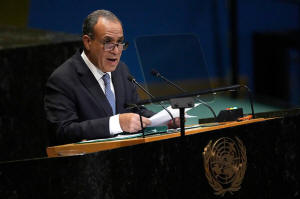Mideast nations confront chaos in their region, which Egypt warns 'is at
a point of implosion'
[September 29, 2025]
By EDITH M. LEDERER
UNITED NATIONS (AP) — Saudi Arabia, Egypt, the United Arab Emirates and
Oman — all nations in the thick of the unrest that has pervaded the
Middle East — confronted the crisis in the region at the annual U.N.
gathering of world leaders, with Egypt’s top diplomat warning that the
Mideast “is at a point of implosion.”
All four countries on Saturday decried Israel’s ongoing pursuit of war
in Gaza and the horrific impact on Palestinian civilians – and they
bemoaned the failure of the United Nations and the broader international
community to achieve a ceasefire and end the bloodshed.
The four ministers spoke a day after Israeli Prime Minister Benjamin
Netanyahu — facing protesters, critics and growing global isolation over
his Gaza policies — told the General Assembly his country “must finish
the job” against Hamas for its Oct. 7, 2023, surprise attack in southern
Israel that killed about 1,200 people. Hamas also took 250 hostages.
Israeli forces recently launched an offensive to take control of Gaza
City.
Here's a country-by-country look at those four leaders' takes from the
U.N. podium on the overall Mideast situation and Gaza in particular.
Egypt
Foreign Minister Badr Abdelatty, whose country has been a key mediator
in Gaza along with the United States and Qatar, sharply criticized the
international community “standing idly by as a spectator” while
international law is systematically violated in Gaza and elsewhere in
the Middle East.
Israel’s “wanton, unjust war waged against defenseless civilians for a
sin they did not commit” is “transpiring without accountability, and it
has affected one country after another,” he said.
Abdelatty recalled former president Anwar Sadat’s historic visit to
Israel in 1977, and Egypt becoming “one of the first to anchor the
pillar of peace in the region.” But surveying the turmoiul in the
Mideast today, he accused Israel of committing genocide in Gaza – which
it vehemently denies – and blocking the Palestinians' fron establishing
an independent state.

Abdelatty said Israel can’t be secure unless other countries in the
region are secure, and “the region cannot see stability without an
independent state of Palestine.”
In the region, he pointed to civil war in Sudan, the need for elections
in divided Libya, resolving Yemen’s crisis between the internationally
recognized government and Houthi rebels who control the capital and most
of the north, and ending repeated Israeli violations of Lebanese and
Syrian territory.
Saudi Arabia
Saudi Arabia’s foreign minister, Prince Faisal bin Farhan, whose country
hosts Russia-Ukraine-U.S. peace talks, said the suffering of
Palestinians and unprecedented humanitarian crisis in Gaza make it
imperative for the international community to end the war in Gaza and
achieve peace through a two-state solution.
A two-state solution to the nearly 80-year Israeli-Palestinian conflict
is “the only path that would guarantee the security of all countries in
the region,” he said. “The failure of the international community to
take firm actions to end the Israeli aggression and violation will only
cause further instability and insecurity regionally and globally” and
“will have grave consequences and will escalate war crimes and acts of
genocide.”
[to top of second column]
|

Minister for Foreign Affairs, Emigration and Egyptian Expatriates of
Egypt Badr Ahmed Mohamed Abdelatty addresses the 80th session of the
United Nations General Assembly, Saturday, Sept. 27, 2025, at U.N.
headquarters. (AP Photo/Pamela Smith)

Farhan said Saudi Arabia, along with Norway and the European Union,
launched an international coalition to implement the two-state
solution, and it co-sponsored Monday’s high-level meeting with
France that saw at least 10 countries officially recognize the state
of Palestine, bringing the total to near 160 recognitions.
“Such recognition is an important step towards achieving the
two-state solution and bolstering the path towards a just and
lasting peace,” he said.
Farhan condemned Israel’s recent attack on Qatar. He also called for
“international measures” to stop Israel’s actions, “and to deter it
from such criminal behavior that threatens regional security and
stability.”
Oman
Omani Foreign Minister Badr bin Hamad al-Busaidi, whose country has
mediated U.S.-Iran talks, called on the international community “to
apply effective pressure to bring Israel to the negotiating table” —
and to adopt measures limiting its ability to continue its killings,
destruction, occupation and policies “of starvation and blockade
against the Palestinian people.”
He condemned Israeli aggression against Iran, Yemen, Syria and
Lebanon and called for sanctions against Israel in response to its
violation of international law and “unlawful encroachment” on the
sovereignty of states.
"We call for a global peaceful campaign to lift the blockade and
undo the injustice imposed on the Palestinian people and to secure
their freedom through the establishment of an independent and
sovereign Palestinian state," al-Busaidi said.
United Arab Emirates
Calling it “a pivotal moment” in a world engulfed in turmoil and
conflict, the United Arab Emirates’ deputy foreign minister Lana
Nusseibeh said there is no justification for Hamas taking hostages
or for Israel targeting “tens of thousands of civilians or besieging
them or starving them and forcibly displacing them.”
Israel’s “unacceptable, expansionist ambitions including the threat
of annexing the West Bank” are also inexcusable, she said.
Nusseibeh urged all countries to recognize the state of Palestine
“as an investment in a better future for the region.”
The UAE has tried to bridge divides elsewhere in the conflict-torn
world, she said, pointing to its role in the exchange of thousands
of prisoners between Russia and Ukraine, hosting peace talks between
Armenia and Azerbaijan, and helping to de-escalate tensions in south
Asia and beyond.
“Our aim is not simply to manage conflicts, but to resolve them
sustainably,” Nusseibeh told the assembly. “The urgent need for this
approach is clear around the world, whether in the Gaza Strip,
Ukraine, Sudan, Yemen, Libya or the Sahel.”
Many crises have been exacerbated by extremist ideologies, hate
speech and incitement, which is why the UAE is promoting an agenda
of tolerance, peace and security, she said. The UAE is also the
largest donor of aid to Gaza, she said.
All contents © copyright 2025 Associated Press. All rights reserved |